ALTO TX300 Series Powered Speaker
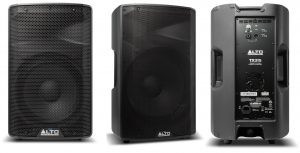
Introduction
Thank you for purchasing the TX3 Series loudspeaker. At Alto Professional, performance and reliability mean as much to us as they do to you. That’s why we design our equipment with only one thing in mind—to make your performance the best it can be.
Box Contents
- TX3 Series Loudspeaker
- Power Cable
- User Guide
- Safety & Warranty Manual
Support
For the latest information about this product (system requirements, compatibility information, etc.) and product registration, visit altoprofessional.com.For additional product support, visit altoprofessional.com/support.
Important Safety Precautions
Please note: Alto Professional and inMusic are not responsible for the use of its products or the misuse of this information for any purpose. Alto Professional and inMusic are not responsible for the misuse of its products caused by avoiding compliance with inspection and maintenance procedures.Please also refer to the included safety and warranty manual for more information.
![]() Caution: To reduce the risk of electric shock, do not connect a TX3 Series loudspeaker to a power outlet while the grille is removed.
Caution: To reduce the risk of electric shock, do not connect a TX3 Series loudspeaker to a power outlet while the grille is removed.
Stand-Mounting
| Important: Do not suspend a TX3 Series loudspeaker. It is not designed for suspended applications. |
- Always install loudspeakers in accordance with applicable electrical and building codes.
- Install the loudspeaker according to its maximum weight. Check the specifications of your stand or pole to ensure it can support the loudspeaker’s weight.
- Observe all safety precautions specified by the stand manufacturer.
- Do not mount multiple loudspeakers on the same stand or pole.
- Always verify that the stand or pole is on a flat, level, and stable surface.
- Always be cautious in windy, outdoor conditions. Do not attach anything to the loudspeaker other than cables or equipment necessary for standard operation.
- Unless you are confident that you can handle the loudspeaker’s weight, ask another person to help you lift it onto the stand or pole.
- Make sure your cables are out of the way of performers, production crew, and audience
Sound Level
Permanent hearing loss may be caused by exposure to extremely high noise levels. The U.S.Occupational Safety and Health Administration (OSHA) has specified permissible exposures to certain noise levels. According to OSHA, exposure to high sound pressure levels (SPL) in excess of these limits may result in hearing loss. When using equipment capable of generating high SPL, use hearing protection while such equipment is under operation.
|
Hours per day |
SPL (dB) |
Example |
|
8 |
90 |
Small gig |
|
6 |
92 |
Train |
|
4 |
95 |
Subway train |
|
3 |
97 |
High-level desktop monitors |
|
2 |
100 |
Classical music concert |
|
1.5 |
102 |
Riveting machine |
|
1 |
105 |
Machine factory |
|
0.5 |
110 |
Airport |
|
0.25 or less |
115 |
Rock concert |
Setup
Volume Control (TX308 & TX310 only)
The TX308 and TX310 loudspeakers accept both line-level and mic-level audio sources.Before connecting your audio source, turn the Volume knob to the minimum position (fully counter-clockwise).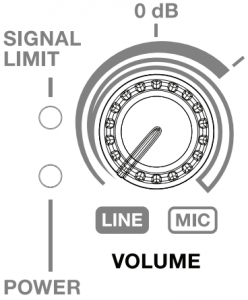
Line-Level Audio SourceWhen using an audio source such as a mixer, CD/MP3 player or audio preamp, follow the outer/Line level band indicator.
If the Signal Limit LED is lit red constantly or the sound is distorted, do not advance the Volume knob any further. Doing so may damage your TX3 loudspeaker. Reduce the signal level of your sound source, or lower the volume with the Volume knob.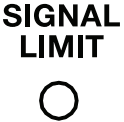
In most circumstances, you will not need to turn the volume beyond 0 dB.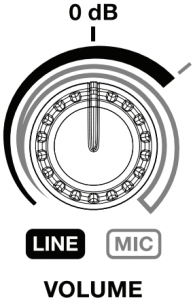

If your audio source has unusually low output, you may turn the Volume knob past 0 dB, but not past the Signal Limit indicator (as explained above).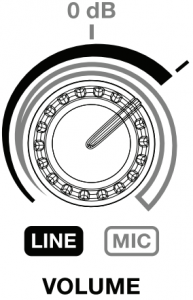

Mic-Level Audio Source
| Important: If you are using an instrument with active preamp, treat the instrument as a line-level audio source (as explained above). |
When using a microphone or instrument audio source, follow the inner/Mic level band indicator.Because the mic and instrument level is typically lower than a line level, you can use the full rotation of the Volume knob.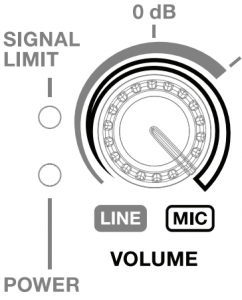




Examples
Items not listed under Introduction > Box Contents are sold separately.
| Note: These examples show the rear panel used by the TX312 and TX315 models, though all four models in the TX3 Series have the same input and output. |
Example A: Two Loudspeakers
Connect each of your mixer’s main outputs to the input on a TX3 loudspeaker. If you are using a TX308 or TX310, do not turn the Volume knobs past the 0 dB position. If you are using a TX312 or TX315, make sure the input selectors are set to Line.
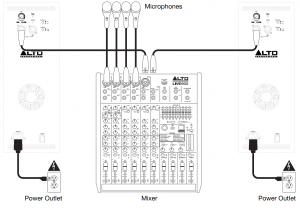

Example B: Two loudspeakers + Two extensions
Connect each of your mixer’s main outputs to the input on a TX3 loudspeaker. If you are using a TX308 or TX310, do not turn the Volume knobs past the 0 dB position. If you are using a TX312 or TX315, make sure the input selectors are set to Line. Connect each of your TX3 loudspeakers’ mix outs to the inputs of your extension loudspeakers.
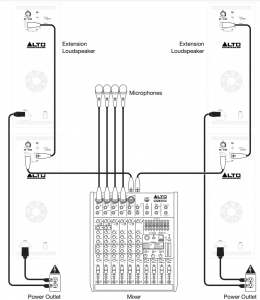

Features
Rear Panel: TX308 & TX310
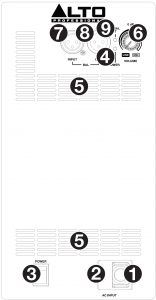

- AC Input: Use the included power cable to connect this input to a power outlet. Make sure the Power Switch is set to off when connecting or disconnecting the cable.
- Fuse: If the unit’s fuse is broken, lift this tab to replace the fuse. Replace it with a fuse with an appropriate rating (printed under the unit’s power cable input).Using a fuse with an incorrect rating can damage the unit and/or fuse.
- Power Switch: Use this switch to power the loudspeaker on or off. Make sure the Volume knob is set to its minimum (counterclockwise) position before turning it on.
- Power LED: This LED lights up when the loudspeaker is on.
- Cooling Vent: Keep the area in front of this vent clear from obstructions.
- Volume: Turn this knob to adjust the loudspeaker’s volume.When using an audio source such as a mixer, CD/MP3 player or audio preamp, follow the outer/Line level band indicator. In most circumstances, you will not need to turn the volume beyond 0 dB. If your audio source has unusually low output, you may turn the Volume knob past 0 dB, but not past the Signal Limit indicator.When using a microphone or instrument audio source, follow the inner/Mic level band indicator. Because the mic and instrument level is typically lower than a line level, you can use the full rotation of the Volume knob.Please see Setup > Volume Control to learn more.
- Input: Use a standard XLR cable (not included) to connect your audio source to this input. Make sure to set the Volume knob to the correct position.
- Mix Out: Use a standard XLR cable (not included) to connect this output to the input of another loudspeaker (i.e., another TX3 loudspeaker).
- Signal/Limit LED: This light illuminates green when audio signal is received and lights red when a high audio signal level activates the internal protection circuit. The protection circuit dynamically reduces the signal level to avoid audible distortion and to protect the woofer and high-frequency driver from over-excursion or mechanical damage. If this light is lit constantly, or the sound is distorted, reduce the signal level of your sound source, or lower the volume with the Volume knob.
Rear Panel: TX312 & TX315
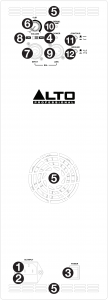

- AC Input: Use the included power cable to connect this input to a power outlet. Make sure the Power Switch is set to off when connecting or disconnecting the cable.
- Fuse: If the unit’s fuse is broken, lift this tab to replace the fuse. Replace it with a fuse with an appropriate rating (printed under the unit’s power cable input). Using a fuse with an incorrect rating can damage the unit and/or fuse.
- Power Switch: Use this switch to power the loudspeaker on or off. Make sure the Volume knob is set to its minimum (counterclockwise) position before turning it on.
- Power LED: This LED lights up when the loudspeaker is on.
- Cooling Vent: Keep the area in front of this vent clear from obstructions. The fan behind the vent cools the amplifier, preventing overheating.
- Volume: Turn this knob to adjust the loudspeaker’s volume.
- Input: Use a standard XLR or 1/4” (6.35 mm) TRS cable (not included) to connect your audio source to this input. Make sure to set the Input Selector to the correct position.
- Input Selector: Set this switch to the Line position when using a line-level audio source connected to the Input. Set this switch to the Mic position when using a microphone connected to the Input.
- Mix Out: Use a standard XLR cable (not included) to connect this output to the input of another loudspeaker (i.e., another TX3 loudspeaker).
- Signal /Limit LED: This light illuminates when a high audio signal level activates the internal protection circuit. The protection circuit dynamically reduces the signal level to avoid audible distortion and to protect the woofer and high-frequency driver from over-excursion or mechanical damage. If this light is lit constantly, or the sound is distorted, reduce the signal level of your sound source, or lower the volume with the Volume knob.
- Contour: Engage (depress) this button to emphasize low and high frequencies by +3 dB.Disengage (raise) the switch for a flatter response for live performance or for maximum output.
- Ground Switch: Engage (depress) this switch to reduce hum or noise.
Appendix
Technical Specifications
Specifications are subject to change without notice.
TX308
| System Type | 2-way active ported loudspeaker |
| Drivers | Low-Frequency: 8.0” (203 mm) driver, 1.4” (35.5 mm) voice coilHigh-Frequency: 1.0” (25 mm) titanium-diaphragm compression driver, 1.0” (25 mm) voice coil |
| Amplifier | 350 watts (peak), 175 watts (continuous), Class D power |
| Horn Coverage | 90º horizontal x 60º vertical (nominal) |
| Frequency Response | 75 Hz – 20 kHz (-3 dB) |
| Crossover Frequency | 2.5 kHz |
| Max SPL | 114 dB @ 1 m |
| Connectors | (1) XLR balanced input (Line/Mic)(1) XLR output (Link)(1) IEC power cable input |
| Controls | Power switch, volume control knob |
| Indicators | (2) power LEDs (1 front panel, 1 rear panel), clip limiter LED |
| Power | Connection: IECVoltage: 100–240 V~; 50/60 HzFuse: T2AL/250VConsumption: 150 W |
| Protection | Thermal, overload analog limiter/compressor |
| Enclosure | Injection-molded polypropylene, multi-angle for main or monitor applications, metal grille, rubber feet, 1 handle on top |
| Mounting/Installation | Standard 36 mm pole socket, wedge monitor |
| Dimensions(height x width x depth) | 16.6” x 10.7” x 9.9”422 x 272 x 251 mm |
| Weight | 12.3 lb5.6 kg |
| System Type | 2-way active ported loudspeaker |
| Drivers | Low-Frequency: 10.0” (254 mm) driver, 1.4” (35.5 mm) voice coil
High-Frequency: 1.0” (25 mm) titanium-diaphragm compression driver, 1.0” (25 mm) voice coil |
| Amplifier | 350 watts (peak), 175 watts (continuous), Class D power |
| Horn Coverage | 90º horizontal x 60º vertical (nominal) |
| Frequency Response | 75 Hz – 20 kHz (-3 dB) |
| Crossover Frequency | 2.5 kHz |
| Max SPL | 117 dB @ 1 m |
| Connectors | (1) XLR balanced input (Line/Mic)(1) XLR output (Link)(1) IEC power cable input |
| Controls | Power switch, volume control knob |
| Indicators | (2) power LEDs (1 front panel, 1 rear panel), clip limiter LED |
| Power | Connection: IECVoltage: 100–240 V~; 50/60 HzFuse: T2AL/250VConsumption: 150 W |
| Protection | Thermal, overload analog limiter/compressor |
| Enclosure | Injection-molded polypropylene, multi-angle for main or monitor applications, metal grille, rubber feet, 1 handle on top |
| Mounting/Installation | Standard 36 mm pole socket, wedge monitor |
| Dimensions(height x width x depth) | 18.2” x 11.2” x 11.0”462 x 284 x 279 mm |
| Weight | 13.4 lb6.1 kg |
TX310
| System Type | 2-way active ported loudspeaker |
| Drivers | Low-Frequency: 12.0” (305 mm) driver, 2.0” (51 mm) voice coilHigh-Frequency: 1.0” (25 mm) titanium-diaphragm compression driver, 1.0” (25 mm) voice coil |
| Amplifier | 700 watts (peak), 350 watts (continuous), Class D power |
| Horn Coverage | 90º horizontal x 60º vertical (nominal) |
| Frequency Response | 70 Hz – 20 kHz (-3 dB) |
| Crossover Frequency | 2.5 kHz |
| Max SPL | 120 dB @ 1 m |
| Equalization | Contour switch with low- and high-frequency +3 dB boost |
| Connectors | (1) XLR/TRS 1/4” (6.35 mm) balanced input (Line/Mic)(1) XLR output (Link)(1) IEC power cable input |
| Controls | Power switch, volume control knob, contour switch, ground-lift switch |
| Indicators | (2) power LEDs (1 front panel, 1 rear panel), clip limiter LED |
| Power | Connection: IECVoltage: 100–120 V~, or 220–240 V~; 50/60 HzFuse: 100–120V T6.3AL AC250V or 220–240V T3.15AL AC250VConsumption: 350 W |
| Protection | Thermal, overload analog limiter/compressor |
| Enclosure | Injection-molded polypropylene, multi-angle for main or monitor applications, metal grille, rubber feet, 2 handles (both sides) |
| Mounting/Installation | Standard 36 mm pole socket, wedge monitor |
| Dimensions(height x width x depth) | 23.7” x 15.0” x 13.5”602 x 381 x 343 mm |
| Weight | 29.3 lb13.3 kg |
| System Type | 2-way active ported loudspeaker |
| Drivers | Low-Frequency: 15.0” (381 mm) driver, 2.0” (51 mm) voice coilHigh-Frequency: 1.0” (25 mm) titanium-diaphragm compression driver, 1.0” (25 mm) voice coil |
| Amplifier | 700 watts (peak), 350 watts (continuous), Class D power |
| Horn Coverage | 90º horizontal x 60º vertical (nominal) |
| Frequency Response | 65 Hz – 20 kHz (-3 dB) |
| Crossover Frequency | 2.2 kHz |
| Max SPL | 121 dB @ 1 m |
| Equalization | Contour switch with low- and high-frequency +3 dB boost |
| Connectors | (1) XLR/TRS 1/4” (6.35 mm) balanced input (Line/Mic)(1) XLR output (Link)(1) IEC power cable input |
| Controls | Power switch, volume control knob, contour switch, ground-lift switch |
| Indicators | (2) power LEDs (1 front panel, 1 rear panel), clip limiter LED |
| Power | Connection: IECVoltage: 100–120 V~, or 220–240 V~; 50/60 HzFuse: 100–120V T6.3AL AC250V or 220–240V T3.15AL AC250VConsumption: 350 W |
| Protection | Thermal, overload analog limiter/compressor |
| Enclosure | Injection-molded polypropylene, multi-angle for main or monitor applications, metal grille, rubber feet, 2 handles (both sides) |
| Mounting/Installation | Standard 36 mm pole socket, wedge monitor |
| Dimensions(height x width x depth) | 24.9” x 15.2” x 14.6”634 x 386 x 371 mm |
| Weight | 31.7 lb14.4 kg |
Trademarks & Licenses
Alto Professional is a trademark of inMusic Brands, Inc., registered in the U.S. and other countries. All other product names, company names, trademarks, or trade names are those of their respective owners.
altoprofessional.com


References
[xyz-ips snippet=”download-snippet”]

